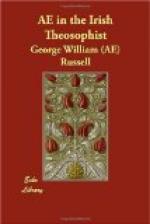I know there are some who regret this, who associate national greatness with the whirr and buzz of many wheels, the smoke of factories and with large dividends; and others, again, who wish that our simple minds were illuminated by the culture and wisdom of our neighbours. But I raise the standard of idealism, to try everything by it, every custom, every thought before we make it our own, and every sentiment before it finds a place in our hearts. Are these conditions, social and mental, which some would have us strive for really so admirable as we are assured they are? Are they worth having at all? What of the heroic best of man; how does that show? His spirituality, beauty and tenderness, are these fostered in the civilizations of today? I say if questions like these bearing upon that inner life wherein is the real greatness of nations cannot be answered satisfactorily, that it is our duty to maintain our struggle, to remain aloof, lest by accepting a delusive prosperity we shut ourselves from our primitive sources of power. For this spirit of the modern, with which we are so little in touch, is one which tends to lead man further and further from nature. She is no more to him the Great Mother so reverently named long ago, but merely an adjunct to his life, the distant supplier of his needs. What to the average dweller in cities are stars and skies and mountains? They pay no dividends to him, no wages. Why should he care about them indeed. And no longer concerning himself about nature what wonder is it that nature ebbs out of him. She has her revenge, for from whatever standpoint of idealism considered the average man shows but of pigmy stature. For him there is no before or after. In his material life he has forgotten or never heard of the heroic traditions of his race, their aspirations to godlike state. One wonders what will happen to him when death ushers him out from the great visible life to the loneliness amid the stars. To what hearth or home shall he flee who never raised the veil of nature while living, nor saw it waver tremulous with the hidden glory before his eyes? The Holy Breath from the past communes no more with him, and if he is oblivious of these things, though a thousand workman call him master, within he is bankrupt, his effects sequestered, a poor shadow, an outcast from the Kingdom of Light.
We see too, that as age after age passes and teems only with the commonplace, that those who are the poets and teachers falter and lose faith: they utter no more of man the divine things the poets said of old. Perhaps the sheer respectability of the people they address deters them from making statements which in some respects might be considered libelous. But from whatever cause, from lack of heart or lack of faith, they have no real inspiration. The literature of Europe has had but little influence on the Celt in this isle. Its philosophies and revolutionary ideas have stayed their waves at his




